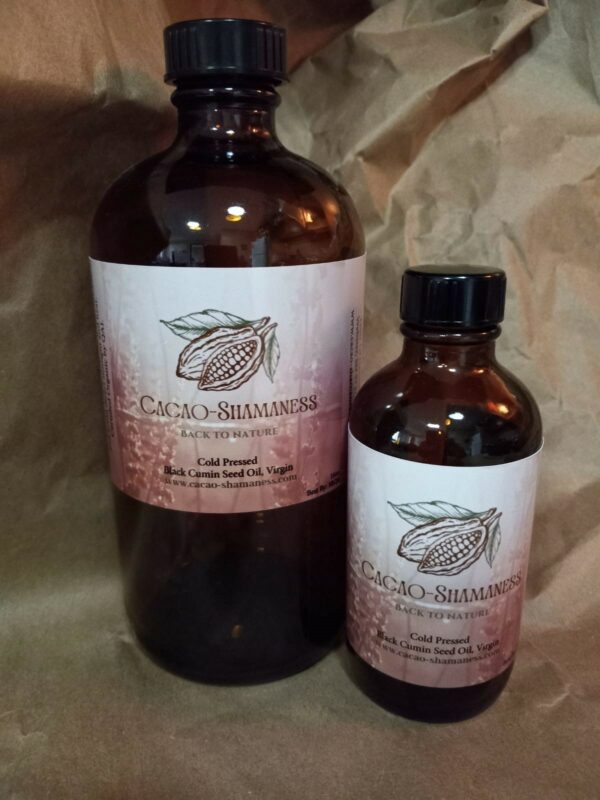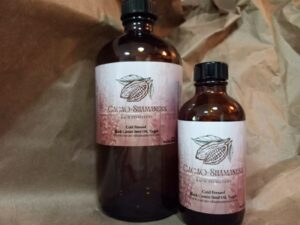Black Cumin Seed Oil
Unveiling the Healing Secrets of Black Cumin Seed Oil
Black cumin seed oil, also known as black seed oil or Nigella sativa oil, has a rich history dating back thousands of years. With its distinctive aroma and numerous health benefits, this oil has captured the attention of people worldwide. In this blog post, we will delve into the origins, uses, health benefits, and proper consumption methods of black cumin seed oil, also addressing the question of whether it is suitable for cooking.
What is Black Cumin Seed Oil?
Black cumin seed oil is derived from the seeds of the Nigella sativa plant, which belongs to the Ranunculaceae family. The plant is native to Southwest Asia, the Middle East, and North Africa. The oil has been a staple in traditional medicine systems like Ayurveda and Unani for centuries, and its popularity has spread across different cultures due to its therapeutic properties.
A Glimpse into History:
Black cumin seeds and their oil have an extensive historical background. The seeds were found in the tomb of Tutankhamun, the Egyptian pharaoh, and were believed to be used for their exceptional health benefits. Throughout history, black cumin seed oil has been valued for its medicinal properties and is referenced in ancient texts, including the Bible and traditional Ayurvedic scriptures.
Uses of Black Cumin Seed Oil:
1. Traditional Medicine:
Black cumin seed oil has been traditionally used to support overall well-being. It has been used to address digestive issues, boost the immune system, improve skin conditions, and promote general health.
2. Culinary Applications:
Black cumin seed oil is also utilized in culinary practices, particularly in Middle Eastern and Indian cuisines. It adds a distinct flavor to dishes and is often used as a finishing oil or dressing for salads and dips.
Health Benefits of Black Cumin Seed Oil:
1. Anti-inflammatory and Antioxidant Properties:
Black cumin seed oil contains thymoquinone, an active compound known for its anti-inflammatory and antioxidant effects. These properties may help reduce inflammation, combat oxidative stress, and protect against chronic diseases.
2. Immune System Support:
The oil has been studied for its potential immune-boosting properties. It may assist in strengthening the body’s defense mechanisms and supporting respiratory health.
3. Digestive Health:
Black cumin seed oil has been used to alleviate digestive discomfort, including bloating, gas, and indigestion.
4. Skin and Hair Benefits:
Applying black cumin seed oil topically may aid in improving various skin conditions, such as eczema, acne, and psoriasis. It is also believed to promote hair growth and strengthen the hair follicles.
5. Respiratory Health:
Black cumin seed oil has been used to alleviate symptoms of respiratory conditions such as asthma, allergies, and bronchitis. Its anti-inflammatory properties may help reduce airway inflammation and support respiratory function.
6. Heart Health:
Preliminary studies suggest that black cumin seed oil may have a positive impact on heart health. It may help lower blood pressure, reduce cholesterol levels, and improve overall cardiovascular function.

7. Weight Management:
Some research indicates that black cumin seed oil may aid in weight management by reducing appetite, improving metabolism, and promoting fat loss.
8. Cognitive Function:
The antioxidant properties of black cumin seed oil may have neuroprotective effects, potentially supporting cognitive function and reducing the risk of age-related cognitive decline.
9. Menstrual Health:
Black cumin seed oil has been used traditionally to address menstrual irregularities and alleviate symptoms of premenstrual syndrome (PMS).
How to consume black cumin seed oil
1. Oral Consumption:
Black cumin seed oil can be consumed orally in its pure form or mixed with other beverages or foods. The recommended dosage varies, but typically ranges from one teaspoon to one tablespoon per day. It is advisable to consult a healthcare professional for personalized advice.
2. Topical Application:
When using black cumin seed oil topically, it can be directly applied to the skin or mixed with carrier oils or cosmetic products.
Is it Suitable for Cooking?
Black cumin seed oil has a distinct and robust flavor, making it a popular ingredient in many traditional dishes. It is generally safe for cooking at low to medium heat. However, prolonged exposure to high heat may degrade some of its beneficial compounds. To preserve its nutritional value, it is best to use black cumin seed oil in dressings, marinades, and as a finishing oil after cooking.
Quality and Safety:
When purchasing black cumin seed oil, it is essential to ensure its quality and purity. Look for cold-pressed or expeller-pressed oils, as these methods retain the oil’s nutritional profile. Additionally, choose organic products and check for third-party certifications to ensure purity and authenticity.
Possible Side Effects and Precautions:
While black cumin seed oil is generally safe for most people, some individuals may experience mild side effects, including stomach upset or skin irritation. It is advisable to perform a patch test before using it topically and to start with small doses when consuming orally. Pregnant and breastfeeding women, as well as individuals with specific health conditions or taking medications, should consult their healthcare provider before using black cumin seed oil.
Cultural Significance:
Black cumin seed oil holds cultural significance in various traditions and cuisines. It is a common ingredient in Middle Eastern, Indian, and North African cooking. In these cultures, it is often used in dishes such as curries, bread, pastries, and spice blends. It is also used as a natural remedy in traditional healing practices across these regions.
How to orally consume it
When orally consuming black cumin seed oil, there are a few methods you can consider. Here’s a step-by-step guide on how to consume it:
Pure Consumption Method:
1. Direct Consumption:
Measure the desired amount of black cumin seed oil using a teaspoon or tablespoon, depending on your preferred dosage. You can consume it directly by swallowing the oil. Some people prefer to chase it with a glass of water or juice to minimize the taste.
2. Mixing with Beverages:
If the flavor of black cumin seed oil is too strong for your palate, you can mix it with other beverages such as smoothies, herbal teas, or freshly squeezed juices. This can help mask the taste while still allowing you to benefit from its properties.
Incorporating into Foods:
1. Dressings and Sauces:
Black cumin seed oil can be added to salad dressings, marinades, or sauces. Combine it with other ingredients like lemon juice, vinegar, herbs, and spices to create flavorful dressings for salads or drizzle it over cooked vegetables.
2. Smoothies and Shakes:
Blend black cumin seed oil into your favorite smoothie or protein shake for an added health boost. Pair it with fruits, vegetables, yogurt, or nut milk to create a well-rounded and nutritious beverage.
Storage and Shelf Life:
To ensure the freshness and quality of black cumin seed oil, store it in a cool, dark place, away from direct sunlight. The oil is prone to oxidation, so tightly seal the bottle after each use. Properly stored, it can maintain its quality for several months.
In conclusion,
Black cumin seed oil offers a wide range of potential health benefits, including anti-inflammatory, antioxidant, immune-boosting, and digestive support properties. While it can be consumed orally or applied topically, it is advisable to use it in moderation and seek professional advice, particularly for individuals with specific health concerns. Whether used for its culinary flavor or medicinal properties, black cumin seed oil continues to captivate people worldwide with its rich history and remarkable benefits.
Remember, it is crucial to start with smaller doses when beginning to consume black cumin seed oil and gradually increase as your body adjusts. If you have any concerns or specific health conditions, consult with a healthcare professional for personalized advice and guidance on the appropriate dosage and usage.
You Might Also Like:

Black Cumin Seed Oil
Black Cumin Seed Oil Unveiling the Healing Secrets of Black Cumin Seed Oil Black cumin seed oil, also known as black seed oil or Nigella

10 Vegan Recipes You Must Try
10 Vegan Recipes You Must Try Shattering Stereotypes with a Side of Laughter! Greetings, fellow food enthusiasts and skeptics alike! Today, we embark on a

My Review On Healing Natural Oils
My Review On Healing Natural Oils And how to naturally heal eczema As time goes by, more new information is revealed to us. If it

Top 10 Energizing Vegan Foods
Top 10 Energizing Vegan Foods A vegan diet, which excludes animal-type products such as meat, dairy, and eggs, has many health benefits. The most obvious

15 Amazing Health Benefits of Eating Kale
15 Amazing Health Benefits of Eating Kale A quick recap for you, to have an idea of how improved your health could be, after adding

The 10-million lecture
The 10-million lecture “By the time this lecture is over, 10 million animals will already be dead.” The Vegan-Friendly Organization, an Israeli association that constantly

7 Healthy Vegan Food Hacks for Traveling
7 Healthy Vegan Food Hacks for Traveling Plant-Based and Vegan diets are on the rise and you may have likely seen many Vegan Recipes available

Top 10 Powerful Benefits of Going Vegan
Top 10 Powerful Benefits of Going Vegan A Vegan diet is considered the healthiest approach to eating, and its benefits go way beyond just weight

Vegan Shavuot (Pentecost).
A little about Pentecost and a collection of vegan recipes. Pentecost is a Jewish holiday, that’s better known as The Feast of Harvest. It’s originally

The Full Guide To Aquafaba
Aquafaba: the Vegan Alternative to Egg Whites Ever wanted to try a meringue recipe but couldn’t find out what to use to replace eggs? I

My Vegan Pantry
Hello friends, cooks, and dear readers. The recent years have benefited the vegan community, with the emergence of a considerable selection of awesome substitutes for

Vegan Recipes – get to know me a bit better
Nice to meet you 🙂 Glimpsing out my kitchen window midday, Cringing with the sun in my eyes – I reflect on my biggest life-changing




















